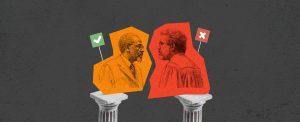The Latin phrase, caveat emptor, ‘let the buyer beware,’ became part of the common law in England in 1603. Four hundred years later, it is still significant in the law relating to the buying and selling of goods – particularly real estate – and to fair contracts.
Its origin as a legal principle comes from the judgment in Tudor times of Chandelor v. Lopus. Mr. Chandelor was a goldsmith and a seller of precious stones. He sold Mr. Lopus a bezoar stone for £100, a very a large sum.
Bezoar stones (which are not actually stones but hard organic material from the stomachs of ruminating mammals) were believed to have curative properties – they could counteract poisons, protect from illness, and be worn as charms. Queen Elizabeth I had one set in silver. They could cost 10 times their weight in gold.
Mr. Lopus was not happy with his purchase. It did not work as he had expected, so he discerned that it was not a bezoar stone. He sued the seller, asking for his money back. The court rejected his claim. The seller, it said, did not guarantee that it was a bezoar stone and, even though the seller knew that it wasn’t, it was for the buyer to make the necessary inquiries.
The court stated:
“the bare affirmation that it was a bezoar-stone, without warranting it to be so, is no cause of action: and although [the defendant] knew it to be no bezoar-stone, it is not material; for everyone in selling his wares will affirm that his wares are good, or the horse which he sells is sound; yet if he does not warrant them to be so, it is no cause of action, and the warranty ought to be made at the same time of the sale.”
It is interesting to note that the claim was not that the medicine, if we can call it that, didn’t work, but that it was not the medicine it was described as. No one doubted that had it been a genuine bezoar stone, it would have worked.
Magical medicine and quack cures of course abounded at a time when medical science was yet to develop. In the early nineteenth century, a charming and handsome young Irishman, who had previously been an artist, set himself up in London as a doctor and claimed to have a cure for tuberculosis. The treatment involved regular massage of the back and chest of his mainly young, female patients, with a secret ointment.
John St John Long became a celebrity doctor and very wealthy, although he had his detractors as well as his fans. After the death of a patient in 1830, he was tried for manslaughter, found guilty, but only fined. He paid the £250 fine in cash on the spot and returned to practicing.
A year later, he faced a second charge for the manslaughter of a naval officer’s wife. He defended himself on the grounds that she had been removed by her family from his treatment shortly before she died, so since he was not her doctor at the time of her death, he could not be responsible for it. The jury agreed and he was acquitted and again returned to practice. Fortunately for his prospective patients, he himself died in a riding accident a year later.
After the second trial and acquittal of John St John Long, the serious medical establishment and his other opponents were outraged. There is little doubt that his quackery and the fake treatments sold by others at the time hastened the establishment of the General Council for Medical Education and Registration in 1858, the first medical regulator.
The development of regulation – whether it be of people, products, trade, or finance –has greatly improved public protection and lessened our individual need as buyers to beware. We can (to a great extent, but not totally) rely on the expectation that the goods we buy will be as described, the medicines we take licensed, and our doctors qualified and competent. However, it is because many Chandlers and St John Longs are still with us that regulators continue to be busy.
Lawyers have suggested that caveat venditor, ‘let the seller beware,’ is the proper protection nowadays and indeed, faulty goods, misrepresentation, and false claims in advertising are all now subject to regulation and the law.
So, as consumers and service users, can we be confident that all is well? Or have we now become overly trusting of the regulation of goods and services? Are we so sure that other people are looking out for us that we have forgotten to look out for ourselves? As citizens, we should be active and alert to the risk of harm.
Regulators and the law cannot protect us from everything. With additional contemporary risks from online shopping, fake goods, cryptocurrencies, lies and untruths on social media or chatbots, phishing, and financial scams it seems that the ancient warning ‘let the buyer beware’, caveat emptor, is in need of a revival.
Harry Cayton is a sought-after global authority on regulatory practices who created the Professional Standards Authority (PSA) and pioneered right-touch regulation. He is a regular Ascend Voices contributor.
MORE VOICES ARTICLES

Trust on trial: Navigating the murky waters of scientific integrity
As fraudulent research papers flood academic journals, the sanctity of scientific discovery is under siege, challenging the very foundation of trust we place in peer-reviewed publications. With AI now both a tool for creating and detecting such deceptions, the urgency for a robust, independent regulatory framework in scientific publishing has never been greater.

Do regulators deserve deference?
In a pivotal moment for regulatory law, the U.S. Supreme Court’s review of the Chevron doctrine could redefine the bounds of deference courts give to regulatory agencies, potentially inviting more challenges to their authority. This critical examination strikes at the heart of longstanding legal principles, signaling a significant shift in the landscape of regulatory oversight and its interpretation by the judiciary.

From Frankenstein to Siri: Accountability in the era of automation
As AI advances in sectors from health care to engineering, who will be held accountable if it causes harm? And as human decision-makers are replaced by algorithms in more situations, what will happen to uniquely human variables like empathy and compassion? Harry Cayton explores these questions in his latest article.

Regulating joy: The risky business of festivities
In his final Voices article of 2023, Harry Cayton reflects on our enthusiasm for participating in cultural festivities that often cause injuries or even deaths, which has led some governments to attempt to regulate these risky celebrations.

Building my regulator of tomorrow with LEGO® bricks
What should the regulator of tomorrow look like? While there may be no definitive vision, contributor Rick Borges gets creative with answering this important question, drawing inspiration from a favorite toy to ‘build’ a model of an effective future regulator.

‘Thin’ and ‘thick’ rules of regulation: Cayton reviews Daston’s history of what we live by
Lorraine Daston explores fascinating examples of rulemaking throughout history in her new book, ‘Rules: A Short History of What We Live By.’ In this article, Harry Cayton discusses what regulators can learn from Daston’s work.








